Lomé, Togo, played host to the 21st seminar of Fratel, the network of French-speaking telecom regulators, on May 21-22, 2024. The event was organized by the Togolese national regulator ARCEP TOGO and the Congolese national regulator ARPCE, the current president of Fratel. The seminar welcomed 18 Fratel members including ILR, the technical partner for the French-speaking rounds of iPRIS, SPIDER, and various industry players. The theme of the seminar was "The data economy and mobile payment: what are the technical and economic regulatory challenges?"
With the acceleration of digitization, data access and exchange have become crucial to economic and social development. It is essential to create a secure environment to encourage the sharing and effective use of data, notably through open access. At the same time, the dramatic increase in data production has stimulated the development of data storage and processing infrastructures, particularly via the cloud, on a global scale.
In a world where every click, every transaction generates an avalanche of data, understanding and regulating this flow is becoming essential. The seminar kicked off with an inspiring presentation by Cina Lawson, Togo's dynamic Minister for the Digital Economy. She captivated the audience with a compelling vision of Togo's digital transformation, highlighting groundbreaking initiatives that are setting new standards in the region.
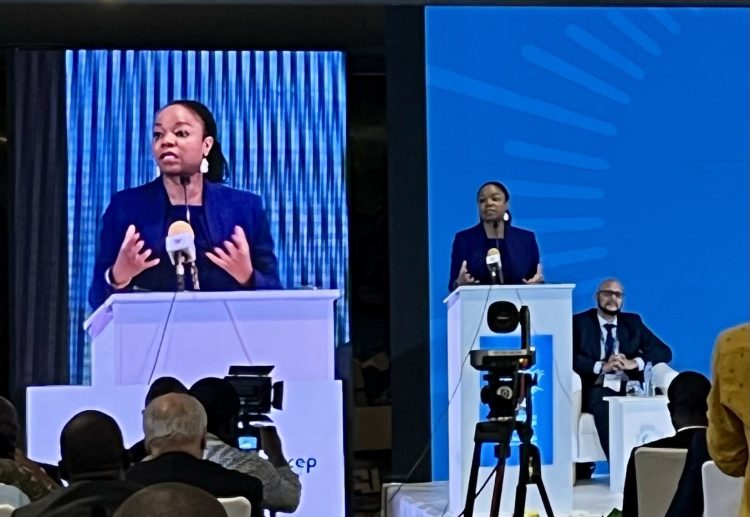 Cina Lawson, Minister of Digital Economy, Togo. ©
Cina Lawson, Minister of Digital Economy, Togo. ©
The seminar was structured around three main panels, each addressing crucial aspects of regulation in the digital economy.
Data economy development
The first panel focused on the development of the data economy, a key issue in the digital age. The data economy refers to all economic activities and processes based on the use of data. It encompasses various practices, technologies and business models centered on the collection, analysis, sharing and use of data to create value.
This first panel, chaired by Marc SAKALA, Managing Director of ARPCE in the Republic of Congo, was introduced by David Guitton, Attorney at Jones Day.
As David Guitton astutely noted, "The data economy implies valuing data. It is the use of data that determines its value".
He stressed the importance for the State to provide a technical and legal framework governing access to data, and a regulatory framework enabling access to data between players (associations, labels, groupings...).
Ms. Laure de la Raudiere, President of ARCEP France, emphasised the importance for Europe of ensuring that digital transformation benefits European citizens and businesses. The seminar was structured around three main panels, each addressing crucial aspects of regulation in the digital economy.

Having explored the fundamental aspects of the data economy, the seminar progressed to the second panel, which looked at an equally crucial theme: "What public interventions to remedy potential market failures in data storage and processing. "
Public intervention in Data storage and processing
The data storage and processing market refers to all the services, technologies and solutions that enable companies and organisations to store, manage and process their data efficiently and securely. It was chaired by Luc TAPELLA, President of ILR (Luxembourg). In her introduction to the session, Ms Rihab RABBAJ, Analyst at Cullen International, highlighted the fundamental aspects and challenges of cloud computing services.
Among the speakers, Daniel ANOUGBA, Head of "Infrastructure Sharing and Access" at RTCI Côte d'Ivoire, focused on data processing market failures, initiatives taken and future prospects in his presentation.
Achille HUNYO, Service and Productivity Supervising Engineer at Ecobank, gave a presentation on public interventions to remedy potential failures in the data storage and processing market.
Jean Francis AHANDA, General Manager DATA CENTER services at ST digital, emphasized: "It is now accepted that the massification of data produced and its circulation are revolutionizing the economy. At once a strategic asset and a decision-making, action and production tool for companies, data is at the root of new decision-making processes and unprecedented alliance strategies between companies in different sectors, just as much as it is provoking new confrontations between economic players." Read more

After gaining a clear understanding of the challenges and interventions required in the data storage and processing market, the seminar then turned its attention to a hot topic: mobile payments.
Sharing experiences on mobile paymentsc
This third panel provided an opportunity to exchange experiences and perspectives, highlighting how this technology is revolutionising financial transactions and promoting economic inclusion. Mobile payments refer to financial transactions carried out using mobile devices such as smartphones and tablets. They enable users to purchase goods and services, transfer money and manage their finances via mobile applications or services.
With insightful keynote speaker Vinyo CAPO, Director of Markets and Data Regulation at ARCEP TOGO, the third panel plunged into the fast-changing world of mobile payments. Mawuli COUCHORO set the scene with a powerful introduction highlighting both the immense opportunities and formidable challenges presented by this technology.
This was followed by contributions from :
Régis ONDO MORO, Director of Markets at ARCEP GABON, who emphasised:
"It should be noted that Mobile Money enables greater financial inclusion of populations through its ability to offer financial services, particularly in rural areas, enabling inequalities to be reduced."
Mrs. Fatou Gueye, Deputy Director of Means and Payment Systems at BCEAO, cited examples of initiatives in certain countries, such as offering free access to certain essential services (the case in South Africa), promoting low-cost data offers for low-income users (the case in India), and deploying free wifi access points (the case in Kenya).
Mr. Sefa HUSUNUKPE, Mobile Money Director at Togocom, gave a brief overview of the mobile payment ecosystem in Togo. According to him, the available offers are still insufficient due to a number of challenges, namely: users' preference for liquidity, limited literacy and low levels of financial education, user identification, user security, and the compartmentalization of the ecosystem.
Achille Tefong VAUMI, Market Engagement Manager for the Mobile Money Program in Francophone Africa at the GSMA, presented an overview of mobile money, with figures supporting its overall growth in Africa, and the GSMA's position on interoperability in mobile money. Interoperability in mobile money refers to the ability of different mobile payment systems and financial networks to work together seamlessly. This enables users to transfer funds, make payments and receive money between different mobile money platforms, banks and other financial services.

In closing, Fratel's seminar in Lomé was not only a platform for intellectual exchange, but also an opportunity for SPIDER and ILR to exchange views with the regulators who will be taking part in the first French-speaking iPRIS cycle, which will begin with training in Luxembourg next September.
In addition to the high-level panels, participants visited ARCEP Togo's headquarters and were impressed by their data collection and analysis capabilities, as well as the availability of data for the general public. Togolese culture was also on show.
Fratel, the French-speaking telecommunications regulation network created in 2003, aims to contribute to training and collaboration between its members. In 2024, Fratel will be chaired by ARPCE Congo, and in 2025 by ARCEP Gabon.
Hosted by the Communications Authority of Kenya (CA), the 29th Annual Assemblies & Extra-Ordinary Congress provided a unique platform for East Africa Communication Organizations (EACO) members and stakeholders to interact, network, exchange experiences, and share insights under the theme "Promoting Digital Transformation in the EAC Region." Delegates to the event included policymakers, legislators, regulators, ICT sector operators/service providers, academia, and ICT consumers from across the East African region.
Opening Session
In his keynote address, the Cabinet Secretary for Information, Communication & Digital Economy in the Cabinet of Kenya, Eliud Owalo, drew relevant case studies from Kenya's successes in advancing the ICT ecosystem. He cited the investments made in infrastructure development that have seen the setting up of over 2,000 public Wi-Fi hotspots, which have deepened affordable access to the mobile internet. He said these were geared towards creating digital marketplaces and boosting connectivity to traders and entrepreneurs, particularly the youth and women, to gain full employment within the digital ecosystem. He also highlighted the successful digitalization of at least 80 per cent (17,017) of public services.
Owalo lauded the East Africa Communications Organization (EACO) for its incredible efforts in advocating for the harmonization of legal and regulatory regimes in the region, saying they are instrumental in realizing digital transformation and providing a united approach to leveraging the full benefits of the region's digital economy.
He added that the success of the One Network area would facilitate increased interaction and e-commerce in the region. At the same time, he called for further collaboration in areas such as cyber security, SIM card registration, standardization of ICT equipment and services in the region, e-waste and green ICTs, which remain critical in catalyzing our attainment of digital transformation goals.
Addressing the session, the Director General of the Communications Authority of Kenya (CA), David Mugonyi, noted that by March 20024, the country had 132 per cent mobile penetration, 51.2 million Internet subscribers, and 38.6 million mobile money users. Smartphone penetration, he said, stood at 67 per cent even as the authority strives to keep average access charges for services such as mobile voice, data, and internet affordable for all.
He added that the regulator was committed to ensuring 100 per cent 3G and 4G population coverage in Kenya. The deployment of 5G technology will present new opportunities for all sectors of the economy. Mugonyi said the Communications Authority had implemented a regulatory sandbox to allow for the controlled use of emerging innovations and testing of new ideas before deployment to the market.
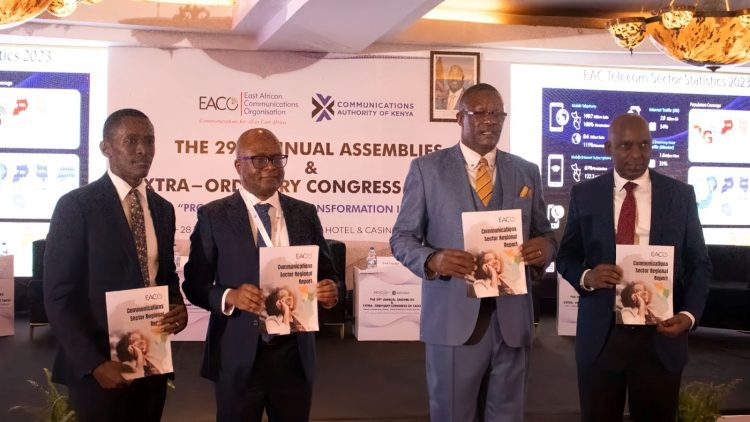
EACO utilized the opening session to unveil The 2023 EACO Communications Sector Regional Report. EACO Executive Secretary Dr. Ally Simba said the extent of coverage of basic mobile connectivity has been influenced by factors such as infrastructure, investment, and regulatory environments.
According to the report, the region has witnessed remarkable advancements in network coverage, a surge in mobile and internet subscriptions, and notable growth in mobile money services with Internet traffic at 54 per cent, with population penetration coverage of 2G averaging 92 per cent, 3G at 78 percent, and 4G averaging 62 per cent. Mobile internet subscriptions stand at 61 percent penetration with 122.3 million subscribers.
These advancements have been influenced by infrastructure, investment, and regulatory environments and have been pivotal in driving socio-economic growth, fostering digital inclusion, and enhancing connectivity across East Africa.
Session 1: High Level Roundtable Discussion on The Role of ICT in Promoting Digital Transformation in the East African Region
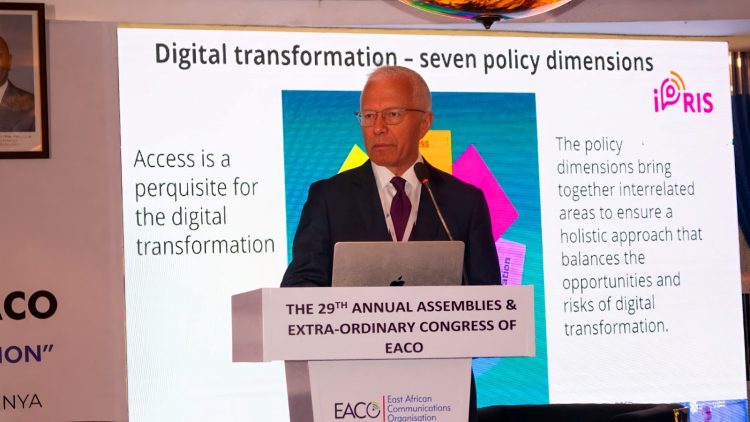 Bengt G Mölleryd- Senior analyst, Swedish Program for ICT in Developing Regions SPIDER
Bengt G Mölleryd- Senior analyst, Swedish Program for ICT in Developing Regions SPIDER
Bengt Molleryd from SPIDER (Swedish Program for ICT in Developing Regions) delivered a compelling opening presentation titled The Steps Towards Digital Transformation in the East African Region. He underscored the critical role of policy and regulatory frameworks in driving digital transformation and positioning the region to compete globally.
In his presentation, he shared some key insights that are critical to the region's attainment of global standards in regulation and technical capacity development. His submissions provided a roadmap for promoting digital transformation in East Africa through strategic policy and regulatory reforms. By addressing infrastructure, affordability, literacy, and regional cooperation, the region can unlock its digital potential and compete globally.
Here is a summary of Bengt's insights:
Other representatives from the region's telecommunications sector regulators engaged in an insightful panel discussion highlighting their respective countries' enormous gains in developing their ICT and telecommunications sectors. They also spotlighted the bottlenecks that continue to hinder the fuller development and exploitation of the sector to match those in more advanced economies.
Despite the challenges the regional ICT sector grapples with, the delegates were confident that the region is on the right track and riding on the support from other partners like SPIDER through its capacity-building program, iPRIS (ICT Policy & Regulation – Institutional Strengthening), East Africa is poised to rise to the global stage and compete effectively in providing the necessary technical and regulatory environment to bridge the digital divide and unlock the untapped potential for innovations and investments in the ICT sector.
Representatives of National Regulatory Authorities (NRAs) from the East Africa region engaged in in-depth subject matter conversation in a lengthy panel discussion dissecting the region's ICT landscape from both technical and regulatory viewpoints. The panelists were:
They were joined by William Baraza, the Director of the African Advanced Level Telecommunications Institute (AFRALTI), who moderated the session.
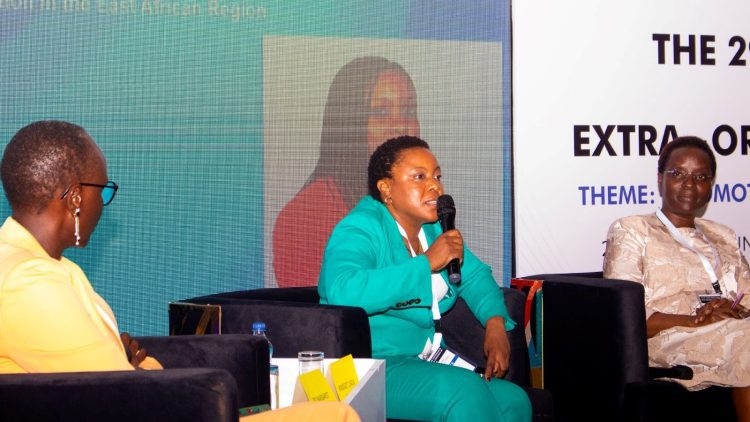 Bridget Linzie- The Executive Secretary at the Communications Regulators’ Association of Southern Africa (CRASA)
Bridget Linzie- The Executive Secretary at the Communications Regulators’ Association of Southern Africa (CRASA)
Commenting on the harmonization of regional digitalization instruments in the Southern Africa region, Bridget Linzie said: "CRASA's approach in regards to digital transformation is to ensure that we bring our people, our citizens the digital connectivity as well as services and applications that will move forward our various economic sectors to where our governments want it to be. This digital transformation strategy has already looked into the strategic goals of where we want to take SADC (Southern Africa Development Community) by 2030. And we also ensured that we look even after the continental strategy and African Union and incorporate the continental agenda into the digital transformation strategy for SADC and as regulators."
Regarding achieving universal access in the East Africa region, Ms Angela Wamola said: "To ensure that unserved and underserved populations are covered, regulators and operators must make deliberate initiatives to ensure that we achieve this total digital transformation. So, there is an opportunity to see ourselves as partners and work together to progress our digital transformation agenda."
Other salient areas the panelists pivoted on and that are core to the region's ICT sector included regional harmonization of policy and regulation, infrastructure development, affordability and accessibility of ICT services, the population's digital literacy, regional cooperation and global best practices.
Session 2: The Role of ICT in Promoting E-commerce in Postal and Courier Services
This session featured speakers such as Joan Toroitich, the General Manager of Payment Services at the Postal Corporation of Kenya, Molefe Mathibe, the CEO of JMAT Business Advisory Services, and Dr. Sifundo Chief Moyo, the Secretary General of the Pan African Postal Union (PAPU).
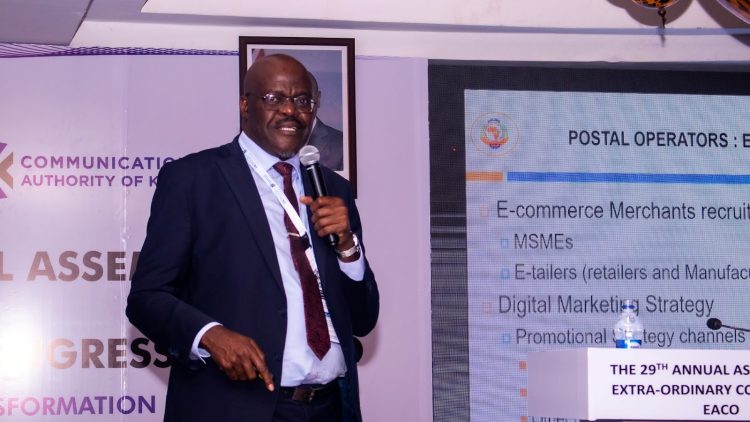 Dr. Sifundo Chief Moyo.- Secretary General Pan African Postal Union (PAPU)
Dr. Sifundo Chief Moyo.- Secretary General Pan African Postal Union (PAPU)
The region's sector representatives discussed the strides made and challenges encountered, particularly in the rapidly evolving technological landscape.
The discussions highlighted significant progress in revolutionizing postal services and the challenges encountered in a rapidly evolving technological landscape. They also highlighted existing policy and regulatory frameworks in leveraging digital technologies to enhance service delivery in the face of a rapidly evolving technological landscape.
Session key highlights
The workshop acknowledged the strides made in integrating ICT with postal and courier services, leading to improved efficiency and customer satisfaction. Digital platforms have streamlined operations, enabling faster and more reliable parcel tracking and delivery. Notable success stories included the adoption of mobile apps and online portals by several East African postal services, which have facilitated easier access to services for customers.
The workshop recognized the transformative impact of mobile payments on e-commerce in the region. Services such as M-Pesa in Kenya and MTN Mobile Money in Uganda have revolutionized payment systems, making transactions more accessible and secure for both consumers and businesses.
Despite these advancements and the fast-paced evolution of technology, the sector faces significant challenges, primarily due to infrastructure deficits, particularly in rural areas. The lack of reliable internet connectivity and poor road networks hamper efficient service delivery in remote regions. Keeping up with the latest digital innovations requires substantial investment in infrastructure and continuous workforce upskilling.
Existing policy and regulatory frameworks are another obstacle since they are often outdated and do not adequately address the needs of the modern digital economy. There is a pressing need for policymakers to develop and implement regulations that support technological innovation and ensure a level playing field for all market participants.
Regulatory challenges also include ensuring consumer protection in the digital space, combating cybercrime, and fostering a competitive market environment. Participants called for more dynamic and responsive regulatory approaches to keep pace with technological advancements.
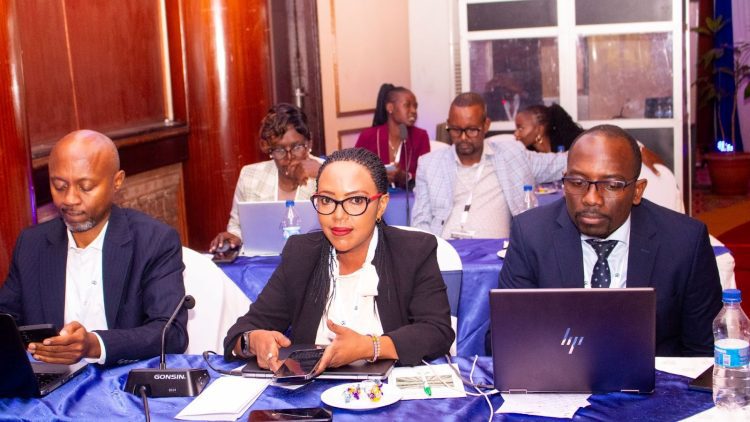 Delegates listening in during the EACO 29th Annual Assemblies & Extra-Ordinary Congress.
Delegates listening in during the EACO 29th Annual Assemblies & Extra-Ordinary Congress.
A recurring theme was the necessity for harmonized policies across East Africa to facilitate cross-border e-commerce. Unified regulations would streamline operations, reduce the complexity and costs associated with cross-border transactions, and enhance collaboration between countries, creating a more integrated and competitive regional market that can better compete on a global scale.
The digital divide between urban and rural areas continues to be a pain point. Rural regions often lack the necessary infrastructure to support advanced ICT solutions, which hampers the delivery of efficient postal and courier services in these areas.
The importance of capacity building was underscored, with discussions focusing on the need for continuous training programs for postal and courier service staff. Equipping personnel with digital skills is crucial for effectively managing ICT tools and platforms.
In conclusion, whereas the region has made significant strides in developing and deploying telecommunications technologies, there is still more ground to be covered in reforms in policy and regulation to facilitate harmonization and cooperation. The region stands at a pivotal moment in its journey towards deepening access and affordability to unlock its digital economy potential and participate more fully in the global arena.
In this context, iPRIS continues to empower telecom regulators in sub-Saharan Africa to boost their capacity to shape and implement regulatory frameworks in the telecommunications sector.
The week-long assembly also featured a packed schedule, including a full-day committees and working group meetings such as the Legal and Constitutional Affairs Committee (LCAC), Finance, Audit & Risk Management Committee (FARMC), EACO Communications Sector Indicators Harmonization and ICT Infrastructure Development, Connectivity, Sharing & Digital Inclusion, among others.
EACO has adopted a new Constitution to effectively deliver its mandate during the Extra-Ordinary in Nairobi. EACO has also admitted ARPTC of DRC and NCA Somalia as new Members and Observers, respectively.
[/et_pb_text][/et_pb_column][/et_pb_row][/et_pb_section]
Interview with Mrs. Bernice Edande Otye, Permanent Secretary of the Assembly of Telecommunications Regulators of Central Africa (ARTAC). By Nancy Onyango.
This interview has been edited for clarity.
Nancy Onyango: Hello Madam, please introduce yourself and tell us about your role at ARTAC?
Ms. Bernice: I'm Ms. Bernice Edande Otye, the Permanent Secretary of ARTAC, the Assembly of Telecommunications Regulators in Central Africa.
Nancy Onyango: Tell us a little about the organization.
Ms. Bernice: ARTAC was created in 2004, and today has 7 members, which are the national regulatory authorities of 7 Central African member states: ART of Cameroon, ARCEP of Gabon, TCHAD, RCA, ARPCE of Congo, ARPTC of the Democratic Republic of Congo, ORTEL of Equatorial Guinea.
Nancy Onyango: What are ARTAC's aims and means of action?
Ms. Bernice: ARTAC aims to reduce the digital divide and accelerate economic and social integration in the sub-region, through cooperation and harmonization of regulatory policies in the field of Information and Communication Technologies. To achieve these objectives, ARTAC carries out a number of activities. It is in charge of harmonizing its regulatory policies; it is also in charge of monitoring and implementing projects in the sub-region. It is responsible for defining a framework for coordinating the frequency spectrum among its member countries. ARTAC makes a point of strengthening the capacities of its members and others in the sector, by sharing experiences and organizing seminars and training workshops. Today, ARTAC has 4 working groups dealing with radio communication, legal and regulatory frameworks, Fin-tech, cybersecurity and governance. We are currently finalizing a flagship project. This involves the effective implementation of “free roaming” between Central African states. We started with the CEMAC member states, and we're going to continue this project with all the states involved.
Integration of the African telecommunications market
In addition to putting in place modern legislative and regulatory structures for the provision of telecommunications services in all the countries of the sub-region, ARTAC has set itself several objectives:
To encourage the separation of roles between political powers, regulatory authorities and licensees/service providers.
Encourage liberalization and competition projects, with a view to reforming networks and improving the efficiency of telecommunications services in the sub region.
Encourage the development of policies to facilitate universal access and telecommunications penetration in rural and underserved areas of the sub region.
Encourage human resources and capacity building to address the shortage of local skilled labor.
Sustainable Data Infrastructure Webinar Highlights
On 19 June 2024, the Data Governance in Africa Initiative organised an online capacity-building webinar on sustainable data infrastructures in collaboration with GIZ, EstDev, and Smart Africa. This webinar underscored the necessity of robust data governance frameworks, stakeholder engagement, and technical considerations such as data standards, interoperability, and scalable architectures that can adapt to evolving technologies. It also addressed the environmental impact of data infrastructures, promoting energy-efficient technologies and responsible data management practices.
Panelists:
Key Highlights from the Webinar:
Economic and social impact of data
Data is a vital asset with transformative potential across various sectors, contributing to economic growth and improved quality of life. It can promote inclusiveness and sustainability in industries. According to Dr. Ott Velsberg, "Data centers today on a global scale range from 5-9% of electricity consumption. In countries with large-scale operations, electricity consumption can be over 10% yearly." Effective data lifecycle management goes beyond just deleting old files. It involves implementing intelligent archiving processes with tiered storage technologies like tape libraries and object storage for ageing out cooler data. Automation ensures stale data gets permanently erased without tying up pricey disk storage.
Promoting green ICT
Data centers are major energy consumers, often overlooked as environmental polluters. Large data centers can use between 1-5 million gallons of water daily, comparable to the consumption of towns with 10,000-50,000 people. The tech industry needs to adopt "green ICT" practices, including energy-efficient hardware and renewable energy sources, to reduce the environmental footprint.
The webinar examined the rising demand for data storage and processing that is raising environmental concerns. Data centers consume significant amounts of electricity, with global consumption ranging from 5-9% and potentially exceeding 10% in some countries. This realization should prompt the tech industry to embrace "green ICT" practices and technologies designed to minimize the environmental footprint of our insatiable digital appetite. Osman Issah emphasized this as a key priority, stating, "We must incorporate green ICT practices, implementing energy efficiency technologies and practices for reducing the environmental impact of data centers."
The need for collaboration
The panelists emphasised the need for robust data governance frameworks, stakeholder engagement, and technical solutions like data standards, interoperability, and scalable architectures. Effective data management involves policies for archiving, deletion, and tiered storage to reduce energy consumption. Engaging all stakeholders, including marginalised communities, is key to building sustainable data infrastructures. According to Bitange Ndemo, "We must have Common Data Standards, Protocols and Interoperability Frameworks, especially in Africa, to enable data integration and harmonisation across different sources and domains."
The role of data in enhancing the quality of life
Government policies and incentives, academic analytical modeling, and community involvement are essential for true sustainability. In today's technologically driven world, data is establishing itself as a crucial asset with revolutionary power in many areas of the economy. Data enhances the quality of life by promoting economic growth and having a cross-sectoral influence. It has the potential to revolutionise industries in ways that promote inclusiveness and sustainability.
Multifaceted importance of sustainable data infrastructures
The sustainable data infrastructure webinar, underscored the multifaceted importance of sustainable data infrastructures. Robust data governance frameworks, stakeholder engagement, and advanced technical considerations are essential in the face of rapidly evolving technologies. The webinar highlighted the economic and social impact of data, emphasising its transformative potential across sectors and its role in promoting inclusiveness and sustainability.
Data is a revolutionary asset with the potential to significantly enhance quality of life. Through effective governance, innovative technical solutions, and concerted efforts towards sustainability, data can drive economic growth and contribute to a more inclusive and sustainable future.
Borgarfjordsgatan 12, Kista,SWEDEN
Postal Address: Stockholm University, Department of Computer and Systems Sciences/DSV, SPIDER, P.O Box 1073, SE-164 25 Kista, Sweden
Copyright © 2025 iPRIS. All rights reserved.